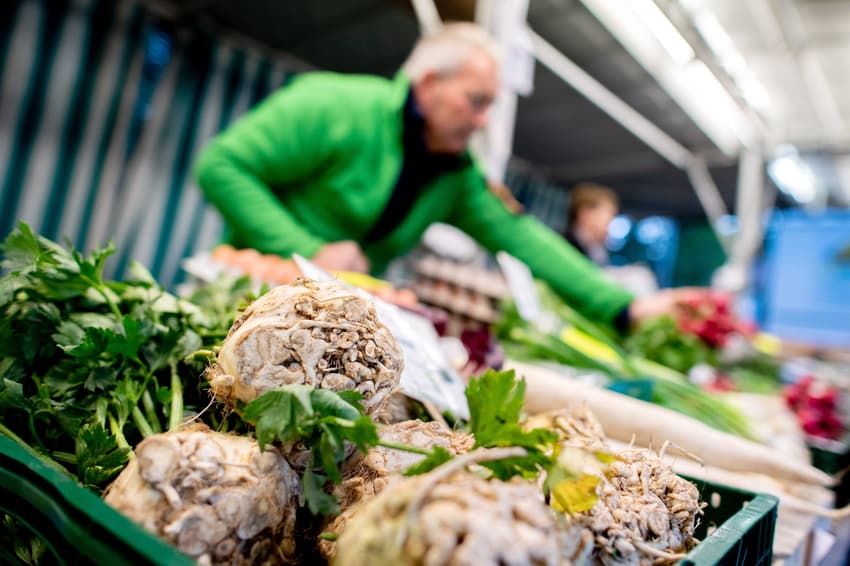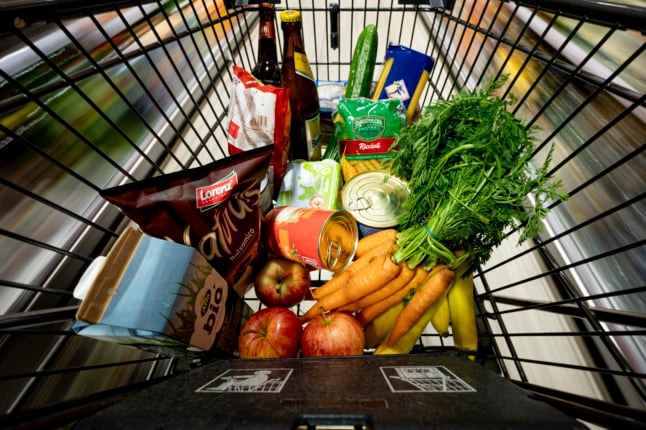EXPLAINED: How much will groceries prices in Germany go up in 2023?

Food and beverage prices in Germany rose more sharply than ever before in 2022: on average, consumers paid 13.4 percent more than in the previous year. Will the spike continue, or is relief in sight?
Alongside energy prices, food prices were a major driver of sky high inflation that Germany saw in 2022. Butter and sunflower oil now cost a third more than before the outbreak of the war in Ukraine almost a year ago on February 24th, 2022.
Milk and egg prices have spiked around 20 percent, and fresh meat and sausages cost around 15 percent more.
Vegetables became about 11 percent more expensive, while fruit prices rose by three percent.
READ ALSO: Germany sees record post-war inflation in 2022
Will this continue in 2023, or can consumers expect prices to fall?
Crucial to the price trend are raw material prices for agricultural products, energy costs and global crop yields - but exact costs are hard to predict.
Overall, prices for cereals and foodstuffs on the world market have fallen again since the cost explosion in spring 2022, according to the Food and Agriculture Organization of the United Nations (FAO) in their latest forecast.
Nevertheless, they remain "at a high level worldwide," said the FAO.
The Federation of German Food and Drink Industries also sees "no price easing yet," chairman Christian von Boetticher said in a statement.
The German Farmers' Association (DBV) also expects food prices to remain at a higher level this year, DBV President Joachim Rukwied told the Berliner Morgenpost. "This is also necessary because the costs of energy, fertilizers and feed in particular are unlikely to fall significantly in the medium term."

A supermarket trolley full of groceries. The prices of everyday items have gone up considerable in Germany in recent months. Photo: picture alliance/dpa | Fabian Sommer
Why organic products are rising less sharply in price
Currently, fertilizers still cost 3.5 times as much as before the war in Ukraine, and energy prices still hover at record high levels, said Rukwied.
"Due to the high cost of inputs, our farms need higher food prices to be able to continue farming at all," Rukwied said. "The raw materials that farmers supply account for about 20 percent of the price of the end products.”
This means that organic farmers who do not use pesticides and synthetically produced nitrogen fertilizers are again at an advantage. The prices of organic carrots, apples, butter or eggs rose less sharply in some cases than the same products from conventional cultivation.
According to a recent study, customers had to pay almost 60 percent more for conventionally produced butter in grocery stores in autumn 2022 than a year earlier. In contrast, prices for organic butter increased by 35 percent at discounters and by 29 percent in supermarkets.
"Organic farming acts as a brake on inflation," says the Federation of the Organic Food Industry (BÖLW). That means that food prices for organic qualities and conventional products have almost converged since the Ukraine war. But organic farmers also need to charge higher prices because the same agricultural area yields fewer crops than conventional farming methods do.
READ ALSO: EXPLAINED: 10 ways to save money on your groceries in Germany
But consumers who buy organic are increasingly doing so in discounters and large supermarkets, which smaller organic stores are feeling through losses - and which has even led to insolvencies.
"Here we are seeing that customers reach for organic products in principle but are increasingly reaching for cheaper organic products," says Peter Röhrig, Executive Director of BÖLW.
However, consumer loyalty to organic products - and thus a purchase decision in favor of sustainability and environmental protection - remains unbroken, he said.
‘Extremely volatile’ markets
According to Rukwied, it is almost impossible to predict how much prices for fruit and vegetables will actually rise.
"It's a bit like looking into a crystal ball and very difficult to assess. The markets are extremely volatile at the moment. It's a constant up and down, so the costs for farms are difficult to calculate."
Another price driver for the next asparagus and strawberry harvests will be the minimum wage, which rose to €12 per hour in October of last year. Some say that the higher wages make Germany a less competitive player around Europe, with it being cheaper for suppliers to buy once-staple German agricultural products such as asparagus from other countries such as Italy.
READ ALSO: 6.6 million people 'set to benefit from €12 minimum wage' in Germany
Food prices in Germany still remain low by European standards. Currently, households spend about ten percent of their total expenditure on food, which is a low figure globally, said Rukwied.
"That can increase a bit, but food is still cheap to buy in Germany."
It would be irresponsible to become dependent on other countries for vital resources, he added. "Especially when it comes to food supplies, this must not happen. We must do everything we can to ensure self-sufficiency."
Comments
See Also
Alongside energy prices, food prices were a major driver of sky high inflation that Germany saw in 2022. Butter and sunflower oil now cost a third more than before the outbreak of the war in Ukraine almost a year ago on February 24th, 2022.
Milk and egg prices have spiked around 20 percent, and fresh meat and sausages cost around 15 percent more.
Vegetables became about 11 percent more expensive, while fruit prices rose by three percent.
READ ALSO: Germany sees record post-war inflation in 2022
Will this continue in 2023, or can consumers expect prices to fall?
Crucial to the price trend are raw material prices for agricultural products, energy costs and global crop yields - but exact costs are hard to predict.
Overall, prices for cereals and foodstuffs on the world market have fallen again since the cost explosion in spring 2022, according to the Food and Agriculture Organization of the United Nations (FAO) in their latest forecast.
Nevertheless, they remain "at a high level worldwide," said the FAO.
The Federation of German Food and Drink Industries also sees "no price easing yet," chairman Christian von Boetticher said in a statement.
The German Farmers' Association (DBV) also expects food prices to remain at a higher level this year, DBV President Joachim Rukwied told the Berliner Morgenpost. "This is also necessary because the costs of energy, fertilizers and feed in particular are unlikely to fall significantly in the medium term."

Why organic products are rising less sharply in price
Currently, fertilizers still cost 3.5 times as much as before the war in Ukraine, and energy prices still hover at record high levels, said Rukwied.
"Due to the high cost of inputs, our farms need higher food prices to be able to continue farming at all," Rukwied said. "The raw materials that farmers supply account for about 20 percent of the price of the end products.”
This means that organic farmers who do not use pesticides and synthetically produced nitrogen fertilizers are again at an advantage. The prices of organic carrots, apples, butter or eggs rose less sharply in some cases than the same products from conventional cultivation.
According to a recent study, customers had to pay almost 60 percent more for conventionally produced butter in grocery stores in autumn 2022 than a year earlier. In contrast, prices for organic butter increased by 35 percent at discounters and by 29 percent in supermarkets.
"Organic farming acts as a brake on inflation," says the Federation of the Organic Food Industry (BÖLW). That means that food prices for organic qualities and conventional products have almost converged since the Ukraine war. But organic farmers also need to charge higher prices because the same agricultural area yields fewer crops than conventional farming methods do.
READ ALSO: EXPLAINED: 10 ways to save money on your groceries in Germany
But consumers who buy organic are increasingly doing so in discounters and large supermarkets, which smaller organic stores are feeling through losses - and which has even led to insolvencies.
"Here we are seeing that customers reach for organic products in principle but are increasingly reaching for cheaper organic products," says Peter Röhrig, Executive Director of BÖLW.
However, consumer loyalty to organic products - and thus a purchase decision in favor of sustainability and environmental protection - remains unbroken, he said.
‘Extremely volatile’ markets
According to Rukwied, it is almost impossible to predict how much prices for fruit and vegetables will actually rise.
"It's a bit like looking into a crystal ball and very difficult to assess. The markets are extremely volatile at the moment. It's a constant up and down, so the costs for farms are difficult to calculate."
Another price driver for the next asparagus and strawberry harvests will be the minimum wage, which rose to €12 per hour in October of last year. Some say that the higher wages make Germany a less competitive player around Europe, with it being cheaper for suppliers to buy once-staple German agricultural products such as asparagus from other countries such as Italy.
READ ALSO: 6.6 million people 'set to benefit from €12 minimum wage' in Germany
Food prices in Germany still remain low by European standards. Currently, households spend about ten percent of their total expenditure on food, which is a low figure globally, said Rukwied.
"That can increase a bit, but food is still cheap to buy in Germany."
It would be irresponsible to become dependent on other countries for vital resources, he added. "Especially when it comes to food supplies, this must not happen. We must do everything we can to ensure self-sufficiency."
Join the conversation in our comments section below. Share your own views and experience and if you have a question or suggestion for our journalists then email us at [email protected].
Please keep comments civil, constructive and on topic – and make sure to read our terms of use before getting involved.
Please log in here to leave a comment.